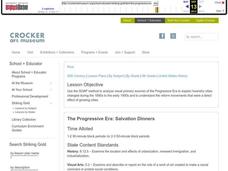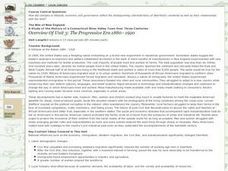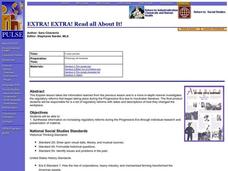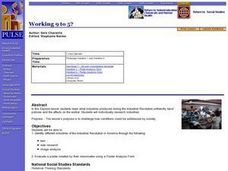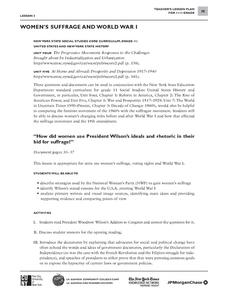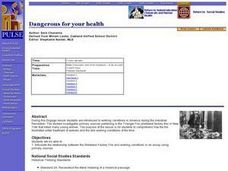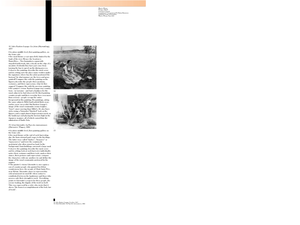Curated OER
The Progressive Era
Eighth graders utilize the SOAP method to analyze a work of art and relate it to what they know about the Progressive Era and the reasons why cities changed and the ways in which cities changed during the end of the 19th century. They...
Alabama Department of Archives and History
Alabama's New South Era
The industrialization and urbanization of Alabama during the New South era (1865-1914) is the focus of a lesson that asks class members to use primary source documents to examine the impact of industrialization on Alabama workers and...
Curated OER
U.S. History: The Progressive Era
Young scholars examine the Colonial Revival Movement as a response to industrialization and immigration. focusing on Deerfield, Connecticut, they create a documentary artifact reflecting the period.
Curated OER
Ragtime: 1880-1920
Build an understanding of the social, economic, and cultural changes that were incited by the American Industrial Revolution. Learners will research the historical context of the Ragtime Era, and compose an oral presentation in the voice...
City University of New York
Urban Politics: Machines and Reformers
What were political machines and whom did they serve? As part of a study of US immigration patterns and how these patterns influenced politics, groups investigate how Tammany Hall and other political machines gained support from voters.
Alabama Department of Archives and History
Cells for Sale - Convict Leasing in Alabama
The benefits and drawbacks of convict leasing following the Civil War are the focus of a lesson that asks groups to examine primary source materials to gain an understanding of the program before individuals decide whether they are in...
Curated OER
A Revolutionary Idea!
Fifth graders explore the Industrial Revolution. They examine the early gristmills and sawmills. Students explain why they were necessary and helpful in the lives of early Americans.
Curated OER
EXTRA! EXTRA! Read all About It!
Young scholars are able to synthesize information on increasing regulatory reforms during the Progressive Era through individual research and presentation of material. They are responsible for a list of regulatory reforms with dates and...
Curated OER
A New Society Project
Ninth graders examine the social and political movements of the Gilded Age and Progressive Era. In this American history lesson, 9th graders work in groups to form their own society and laws. Students make a diagram of their town and...
Curated OER
Understanding The Progressives And Their Viewpoints
Eleventh graders explore the Progressive Era in American history (1900-1917). They use the internet and other sources to research the Progressive Movement, identify three Progressive presidents, and explore considered reforms. Students...
Curated OER
Coming to America: U.S. Immigration
Analyze primary source documents relating the conditions under with prompted American immigration. Learners will analyze information in order to create a six-panel pamphlet. Much of the lesson is not available but the key objectives are....
Curated OER
Working 9 to 5?
Students identify different industries of the Industrial Revolution in America through the following: text, web research and image analysis. They evaluate a poster created by their classmates using a Poster Analysis Form.
Curated OER
Diseases Are Real
Eleventh graders research industries that contribute to sanitation and pollution problems. They investigate the direct result of unhygienic practices including disease outbreaks or specific illnesses. They create a Power Point...
Alabama Department of Archives and History
Nellie Bly to Dr. Peter Bryce: 19th Century Asylum Reform
What kind of treatment could a patient expect in an asylum during the 1800's? The abusive and neglectful conditions in 19th century asylums are the focus of a lesson that examines the work of reformers Nellie Bly, Dorothea Dix, and Dr....
City University of New York
Woman's Suffrage and World War I
How did women use President Wilson's ideals and rhetoric in their bid for suffrage? To answer this essential question, class groups analyze primary written documents and visual images.
Stanford University
Jacob Riis
Fourth graders view and discuss the photographs of Jacob Riis.In this Jacob Riis and Immigrants instructional activity, 4th graders analyze the photographs of Jacob Riis and answer questions about the feelings evoked by the photographs....
Curated OER
Dangerous for your health
Students articulate the relationship between the Shirtwaist Factory Fire and working conditions in an essay using primary sources. They are introduced to working conditions in America during the Industrial Revolution.
Alabama Department of Archives and History
Voting Rights for Alabama Women
What were the arguments put forth by those who opposed the 19th Amendment? For those in favor? Class members examine primary source materials that illustrate the intense debate in Alabama about women's suffrage.
Alabama Department of Archives and History
W.E.B. DuBois, Booker T. Washington, and Jim Crow
Class members use the think-pair-share strategy to compare the views of W.E.B. Du Bois and Booker T. Washington and to consider how each man's backgrounds influenced his philosophy.
Curated OER
Glided Age
Eleventh graders will participate to brainstorm on the overhead, characteristics of an "irresponsible" adult and 5 of a "responsible" one? How do these differ if we apply these to businesses? Working in partners--Create a Code of Ethics...
Alabama Department of Archives and History
Booker T. Washington and W.E.B. DuBois
Where to begin? With the vocational education that provides the skills necessary to gain economic security or with a Liberal Arts education? As part of a study of leaders of the civil rights movement, class members compare and contrast...
Curated OER
Cartoon and Political Poster Analysis
Students explore the late 1800s as a time of demographic change in the US. They view the role of media during this time in the form of posters and political cartoons. They create a political poster/cartoon that deals with current...
Curated OER
Activism and Social Reform in America from 1800-1850
Students discuss idea of social status, examine antebellum social reform movements, and compare and contrast experiences of activists who sought to improve workers' lives, end slavery, reform immigration laws, and establish voting rights...
Curated OER
The Rural World Seen by Artists 1848-1914
Students prepare to visit the art museum and view the rural world as seen by artists of 1848 - 1914. In this Monet instructional activity, students examine the haystacks series of artworks by Monet. Students observe social change in the...


